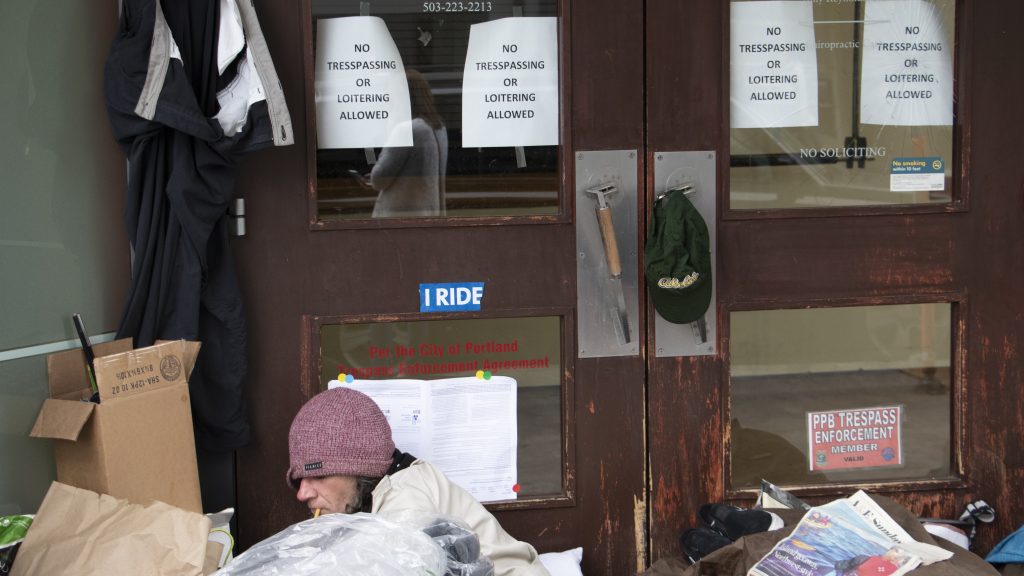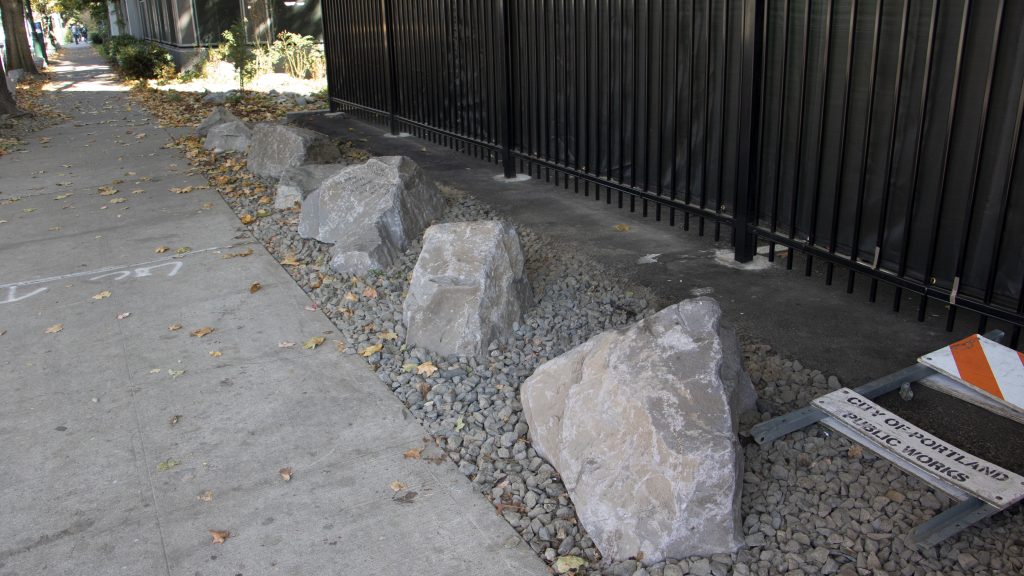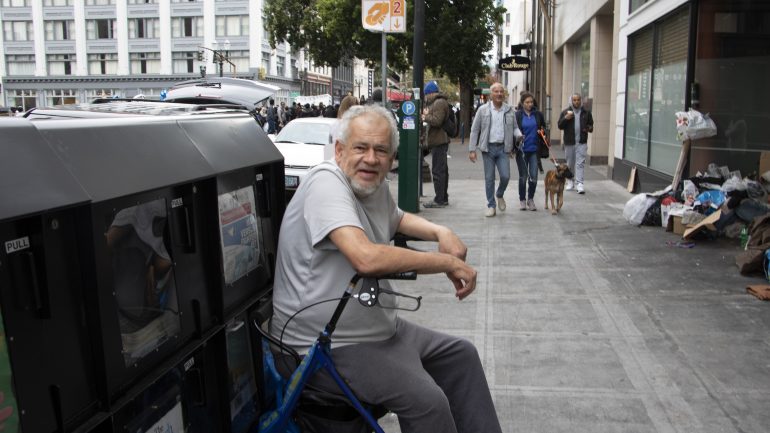The forecast for December is stormy. This November, Portland experienced lows consistently cooler than average, between 27ºF and 41ºF. With limited shelter beds, recent freezing weather, and overburdened resource centers, the practice of clearing houseless encampments in sweeps by Oregon Department of Transportation (ODOT) and the City of Portland puts thousands of houseless citizens at risk.
Until September 1, 2016, there were hundreds of people inhabiting an encampment that stretched along two miles of the Springwater Corridor bike trail. At the time, Willamette Week reported that it was the “largest encampment in the Pacific Northwest,” possibly the largest in the United States. Police descended on the site, in “the largest coordinated sweep in a tenure.” It was authorized by Former Mayor Charlie Hales, despite there being a lack of beds in shelters to house all of the houseless they would displace.
When Mayor Wheeler came into office in January 2017, average temperatures were 33.5ºF and weather was particularly severe. There were 750 shelter beds. That month, five people died of hypothermia on the streets, according to the Domicile Report which tracks deaths in the houseless community. The total number of deaths for 2017 was 79.
The city might be able to sweep more camps soon. As of now, the city is limited in how it can approach land owned by ODOT. The city and state have different policies for clearing camps because of different legal settlements. For example, a court order requires ODOT to give at least 10 days notice before clearing a camp. If ODOT has posted permanent “no trespassing” signs to a property, it can give just 24 hours notice. Portland, on the other hand, abides by a settlement called The Anderson Agreement, that, among other things, requires at least 24 hours notice before a sweep that must be conducted within a week of notice. Because of the disparate policies, the two agencies have to be in close communication to coordinate sweeps. But that’s all set to change in January 2019 when House Bill 4054 goes into effect, allowing ODOT to bypass the court order and contract with the city to carry out its camp sweeps.

This November, Mayor Wheeler spoke at the Oregon Health Forum to discuss what his office has done and proposes to do about the growing housing crisis in Portland. Housing, Wheeler said, is a top priority. He said the number of shelter beds have doubled since he took office; the city invests $33 million a year to resources such as “homelessness prevention and transition.” He espoused programs like the Clean Start Program, which employs houseless people to clean trash around the city. Moving forward, City Council committed to two thousand units of permanent housing, and the city is in the process of creating a “Navigation Team,” modeled after programs in Oakland and San Francisco that would connect individuals to social services and track results over time with a data management system.
Wheeler also said that “because of the change in our strategy, we no longer allow large-scale mass encampments in our community.” He was emphatic that sweeps are done in the most humane way possible: no one is arrested, belongings are collected and stored for retrieval, and that social workers are present. “There’s a lot of misconceptions,” Wheeler said about the sweeps, “you get this image of the cops coming in and a dump truck showing up and everyone is rousted out of their sleeping bag and all their belongings are thrown into a dumpster and they’re kicked to the curb.” A heckler interrupted, “That’s the truth, Mayor. That’s exactly what’s happening,” and proceeded to challenge the Mayor’s insistence that social workers are required to attend the sweeps. Wheeler responded, “I am telling the truth and you will have other people here who actually do this work who will tell you what they do.”
For those that live on the Springwater Corridor, the Clackamas Service Center (CSC) is one of the main resources for food, clothing and even mail service. Michael Boldt, the Program Director at CSC, has over 26 years of experience working in the houseless support community. Boldt is typically the first person to interact with people as they come into the center. He commented on the city’s use of encampment sweeps.
“I see how it affects our members everyday,” Boldt said. “They arrive at our center agitated and it translates to how they treat fellow members and staff. It also means that CSC needs to replace all the items that were taken in these sweeps. It’s a vicious cycle that affects our community on a daily basis…There has to be a better way. I’m not sure what that is though.” Another argument against these sweeps is that they are not a permanent solution. Camps just reconvene after the sweep. Michael Harris, an urban campsite occupant, described the routine: “Anytime we get swept, we only move about 30 yards away.”

ODOT uses another strategy across Portland to deter people from camping: hauling dozens of heavy boulders (see photo: bottom right) to former campsite locations under overpasses across the city. When asked how much a boulder weighs, an ODOT worker responded, “around 300 to 1000 pounds.” From July 2017-18, ODOT spent $1.8 million of taxpayer money to clear and clean campsites, double the amount spent in the previous year. Don Hamilton, a spokesperson for ODOT, told KOIN 6 News, “[ODOT] will do what the law requires us to do, what legal requirements require us to do and, I think, what taxpayers expect us to do.” It is unclear if placing boulders is included in these costs, but a similar approach to a site under I-90 in Spokane, WA cost $150,000 last year. A week after the boulders placement, however, Spokane City Council President Ben Stuckart said he regretted the decision, since hundreds of people complained, calling the approach inhumane. In response, Stuckart called for a tent city.
In 2016, the City of Portland began an online reporting system called One Point of Contact, a website that displays a weekly map of all reported campsites, and which are being cleaned or have been “referred to Non-City Agency (ODOT, UP RR, etc.).” While the site includes a feature that allows anyone to track the change in reported campsite locations over the last 12 weeks, it does not explicitly report how many camps are swept weekly, but notes that “before a cleanup can occur, the City will work to move the camp, and will do so in the least traumatic, most compassionate manner possible.”
Multnomah County began tracking deaths in the houseless community in 2011, and publishes the findings in an annual review called Domicile Unknown. Since 2011, it says 438 houseless people have died. It notes, however, that “the number of deaths is almost certainly higher because the tally only captures a portion of those who died in hospitals.” The 2017 Domicile Unknown reports 79 houseless individuals died on the streets. 58% of the deaths occurred between October and March, including five people who died of hypothermia in January 2017, the month Ted Wheeler came into office, when average temperatures were 33.5ºF and weather was particularly severe. Such sweeps could lead to more deaths by hypothermia in 2018. The forecast for December is stormy, and the cycle goes on.






Misconceptions? WTH? These sweeps continually take what peole have and need to survive. People already struggle to survive on the streets so when someone takes what they have from them it makes it harder for them. It’s not a wonder that mental health is getting worse as well as sense of security while homeless. People that continually have things taken from them, by any means, will start hanging on to things more and start thinking even things not needed- are needed. It is a sad cycle. A lot of the homeless feel harassed in one way or another, causing them to feel unsafe, threatened, anxious, worried, alone, scared, like a target. If you want to reduce homelessness, give better options. Most of us have no choice because we can’t afford rent.